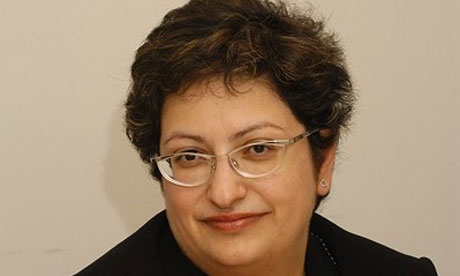
BBC chief operating officer Zarin Patel, who has said gender issues are not currently one of the corporation's worries. Photograph: G.Myrie@arts.ac.uk
The BBC's chief operating officer Zarin Patel has said the corporation has "stopped worrying about gender issues".
On any day such a remark might have been viewed as unfortunate. On International Women's Day, doubly so.
Patel, who is a member of the BBC's executive board, said: "To be honest, we have stopped worrying about gender issues at the BBC.
"In fact, in my team one of the things we worry about is whether there are enough men."
Patel made the comments in an interview with accountancy and finance magazine, Economia, and appears to contradict the sentiments of director general Mark Th• To contact the MediaGuardian news desk email editof you are writing a comment for publication, please mark clearly "for publication".ompson, who said last month that there were "manifestly too few older women broadcasting on the BBC".
Thompson was speaking a year after former Countryfile presenter Miriam O'Reilly's landmark age discrimination win against the corporation.
Patel said: "Half the BBC's workforce is female and that is reflected in finance. Just over a third (35%) of our senior leaders are women and 45% of the board. That's well above average and are only a few companies can match it.
She added: "We haven't just arrived at these figures over night. The BBC has had targets for quite a while - and yes, that's targets but not quotas.
"We started thinking about these issues almost 20 years ago, largely because we had very enlightened leadership who thought that there should be more women in senior positions, if only to reflect population trends.
"You have to think about this as a long-term target. It's very important to work on the talent pipeline, rather than just putting women on boards because it's fashionable to do so."
Patel, who earns a total pay package of £365,000, said as a woman you "want to do good work and be recruited into a role because of who you are and what you do, rather than because of the fact that you are a particular gender".
A BBC spokeswoman said: "As Zarin says, the BBC has made good progress with women's representation across its workforce and today half of the BBC's staff and five of the executive board members are female. We are now focused on applying the same thinking to the representation of women on air and on screen."
• To get the latest media news to your desktop or mobile, follow MediaGuardian on Twitter and Facebook

No comments:
Post a Comment